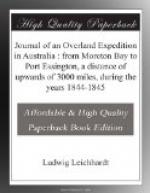Feb. 13.—The morning was very cloudy. I continued my course to the northward, and, coming to a watercourse, followed it down in the hopes of finding water: it led us to the broad deep channel of a river, but now entirely dry. The bed was very sandy, with reeds and an abundance of small Casuarinas. Large flooded-gums and Casuarinas grew at intervals along its banks, and fine openly timbered flats extended on both sides towards belts of scrub. The river came from the north and north-west, skirting some fine ranges, which were about three miles from its left bank. As the river promised to be one of some importance I called it the “Isaacs,” in acknowledgment of the kind support we received from F. Isaacs, Esq. of Darling Downs.
When we were approaching the river, the well-known sound of a tomahawk was heard, and, guided by the noise, we soon came in sight of three black women, two of whom were busily occupied in digging for roots, whilst the other, perched on the top of a high flooded-gum tree, was chopping out either an opossum or a bees’ nest. They no sooner perceived us than they began to scream most dreadfully, swinging their sticks, and beating the trees, as if we were wild beasts, which they wished to frighten away. We made every possible sign of peace, but in vain: the two root-diggers immediately ran off, and the lady in the tree refused to descend. When I asked for water, in the language of the natives of the country we had left—“Yarrai” “yarrai,” she pointed down the river, and answered “yarrai ya;” and we found afterwards that her information was correct. Upon reaching the tree we found an infant swaddled in layers of tea-tree bark, lying on the ground; and three or four large yams. A great number of natives, men, boys, and children, who had been attracted by the screams of their companions, now came running towards us; but on our putting our horses into a sharp canter, and riding towards them, they retired into the scrub. The yams proved to be the tubers of a vine with blue berries; both tubers and berries had the same pungent taste, but the former contained a watery juice, which was most welcome to our parched mouths. A similar tuber was found near Mount Stewart on the 18th January. We then proceeded down the river; but not succeeding in our search for water, returned to our camp, which was about fifteen miles distant. As soon as I arrived, I sent Mr. Gilbert and Brown down Hughs’s Creek, to examine the country near its junction.
Very thick clouds came from the westward, from which a few drops of rain fell: thunder-storms were forming to the north-east and also to the west, but none reached us: the night was very cloudy and warm: the scud flying from the north-east.
Feb. 14.—After sunrise the weather cleared up again. All hands were now employed in shooting crows; which, with some cockatoos, and a small scrub wallabi, gave us several good messes.




